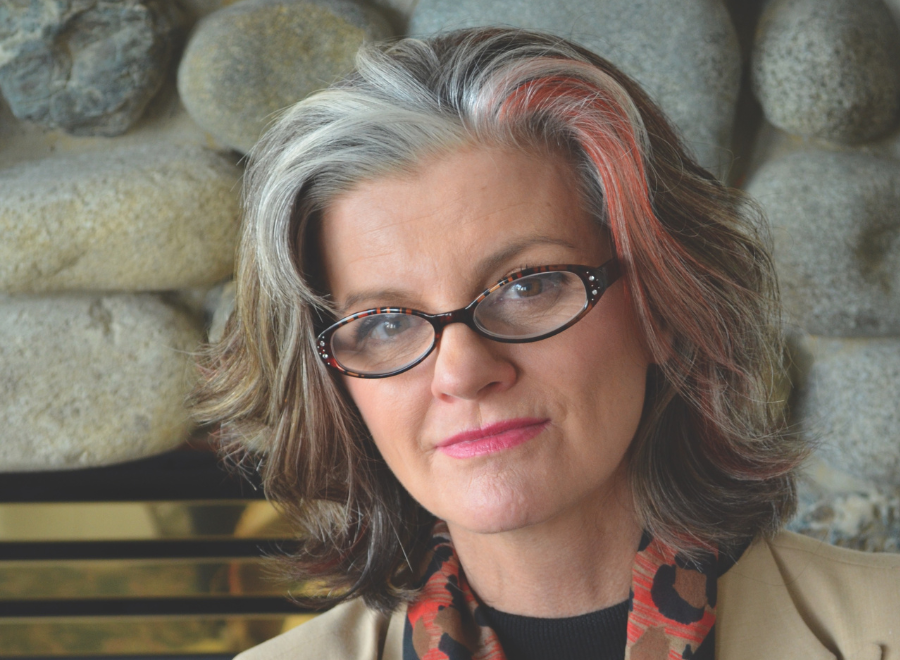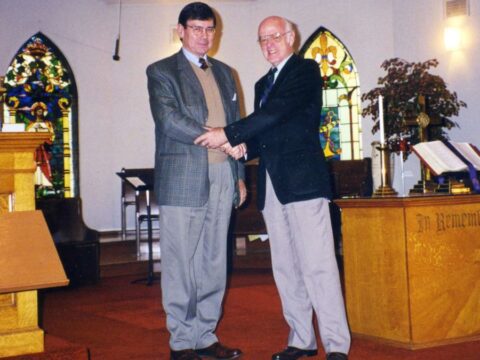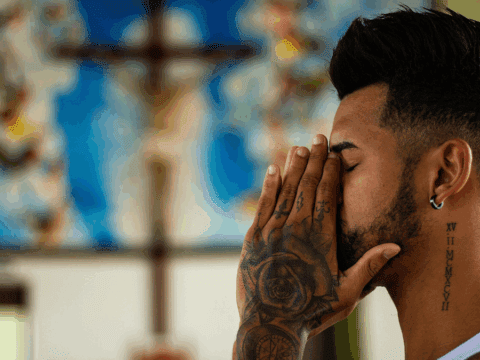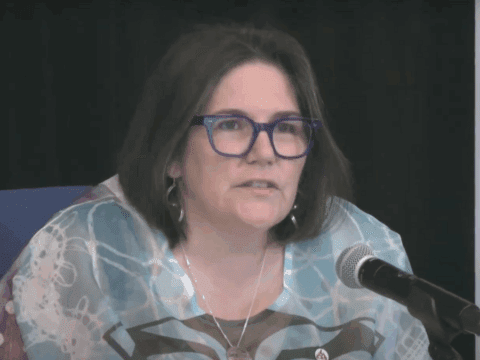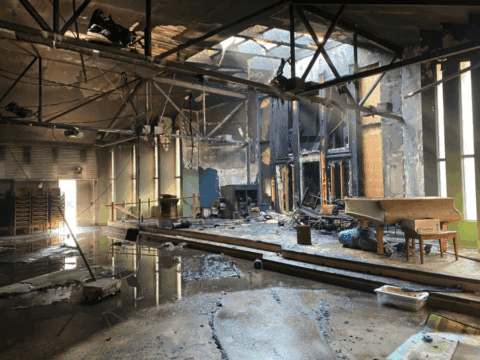Irene Champagne spoke to Kate Spencer on the phone from Bella Bella, B.C.
Kate Spencer: Why does the legacy of residential schools still have an impact today?
You may unsubscribe from any of our newsletters at any time.
Irene Champagne: There have been a variety of oppressions of racial groups, but most of them didn’t last 150 years. We’re talking 150 years of deliberate, strategic attempts to eradicate the structure of a people. That has left its scar, and it’s deep. A lot of non-First Nations people tend to ask, “What about these other groups that were oppressed?” But the timelines are just so different.
KS: What kind of hurt do you see?
IC: What I have observed after working with survivors for 25 years is that there are five generations of people whose authentic sources of comfort were stripped away: their family, cultural identity and feeling of being firmly attached (psychologically and socially) to a people. When the children were removed [from the communities], everybody got sick, even if they weren’t related to any of the children.
The social demographic of a balanced community includes school-aged children. Their presence alone, where they’re curious, experimenting, learning and developing, is healthy for everybody. Children compel us to be better role models. The honour and dignity of being able to provide for a family helps to keep us in line, and the community too.
So, think of 150 years without having school-aged children: it’s a natural progression toward a self-destructive social system. It’s not absolute, and there are lots of people who have demonstrated a spontaneous resilience, where, by some miracle of grace, they found something in themselves to help them bounce back. But when a social system is disrupted for five generations, you see a lot of normalized dysfunction. This could simply be caused by lost opportunities to develop certain attachments.
If my 10-year-old self never learned to be able to confidently reach out for comfort in an intimate way with someone who unconditionally cared for, loved and understood me, then there is a part of me that is underdeveloped, and that is a deficit to the entire community.
KS: How do you approach trying to heal people?
IC: I don’t know whether you actually do heal people. Every individual who comes to me for help — I’ve worked with 147 individuals in this particular contract with the United Church — every person is completely different, and I can’t generalize. I do see an overrepresentation of people who are baffled as to how to find sustainable, authentic sources of comfort.
For most of us, the most authentic sources of comfort are our families and our faith. And what residential school did was tear people away from those things in the name of God. One of the things that’s really delicate for me as a staff member of the church is to respond to people who need, as part of their process, to blast off in anger toward the church and God.
If I were a really dark force and I wanted to render a people disabled, I would take them as children and ruin their relationship with their families and their God. I actually can’t imagine a more effective way of destroying a culture. We create a bitter, rigid notion of God, and we ruin their connection with their families.
There is a sense from the outside of wondering when is it going to end, when are they ever going to heal? I speak to the fact that it’s a miracle they’re still alive. Most of us would have perished by now.
KS: Does the fact that the United Church is funding this work make your clients a little more inclined to forgive the church for its part in the residential school system?
IC: I don’t experience myself as part of any atonement. I think I would leave that up to much higher authorities than the church and me. But there are residential school survivors who have an amazing tenderness toward the church, and that is sometimes more heartbreaking than people who have outrage.
There are definitely people saying they are glad to see the church putting its money where its mouth is. When I was at the Truth and Reconciliation event in Vancouver [last September], a First Nations person came up to me and said, “So you’re the apology.”
I said, “Whoa, all of a sudden I feel really inadequate.” I’m a tiny part of the entire church body’s apology. The apology will always be inadequate. It will never be enough. But that doesn’t mean it’s worthless, if it’s offered in love.
KS: What is it like to service four communities all at once?
IC: Everybody thinks I live in their community! I have to take advantage of breaks in the weather to move around, because I can get grounded and miss important family events or run out of food, and there’s nothing that can be done.
My commute involves some fairly articulate travel planning. In order to get here to Bella Bella, I had to drive 500 kilometres from my home [on Vancouver Island], ride on a ferry where all of the sleeping berths were sold out, so I slept on the floor, arrive at 2 a.m., and then find my way to my residence. It’s not like when you land at Pearson [in Toronto] and get picked up by a cab.
But people who work in remote communities all understand what it’s like, so there’s a beautiful feeling of family. I get off the ferry, step off the plane or show up in town, and people will say, “Welcome home, Irene.” People in the villages are really kind; it’s one of the things that’s most moving. That’s the emotional environment these children were torn from to go to residential schools.
KS: How did you get involved in this work?
IC: I’ve been working as a counsellor since the mid-1970s. When I was in grad school, I was pursuing an understanding of psychological growth that included the presence of faith in a higher power. That tossed me in with a bunch of people who were working with First Nations groups. The presence of a faith life, the First Nations’ connection to the Great Spirit: the residential schools tried to eradicate that but couldn’t.
I worked a brief spell as a youth and family therapist and noticed that there was an over-representation of First Nations people in the groups I dealt with. I knew there was a root cause, a systematic wound. I became very interested in that wound.
KS: Do you think it’s possible to overcome the impact of residential schools? Are you hopeful?
IC: I’m very hopeful. I’ve been to a couple of Truth and Reconciliation events, including the most recent one in Vancouver, and what I saw in most of the people who attended was a resolve to be well.
They resolved to take a look at what they had been through, which for many of them involved horrific and almost ritual abuse, and to see it as being in the past — to stop the immediate suffering.
I saw people really tuning into the truth that they had survived. They recognize that the Eurocentric machine that sent them to residential schools was wrong — it made a huge mistake. The damage to the psyche, to the self, is so profound. But people grow and change, and it’s such a privilege and honour to be on the sidelines watching that happen. I’m so moved by the courage and strength of the people I work with; it blows me out of the water. I am awestruck by their depth and sensitivity and how they keep going — finding ways to love deeply and love themselves.
If Eurocentric Canada looks at First Nations people and sees only the dysfunction, that would be a mistake. There are a lot of social problems, but what I want the rest of Canada to see is the miracle of resilience — that the First Nations people, because of colonial practices, lost just about all their sources of comfort and strength, yet they are a very strong, joy-filled, love-filled and surprisingly faith-filled people.
This interview has been condensed and edited.
***
This story first appeared in The United Church Observer’s March 2014 issue with the title “‘I want the rest of Canada to see the miracle of resilience.’”

